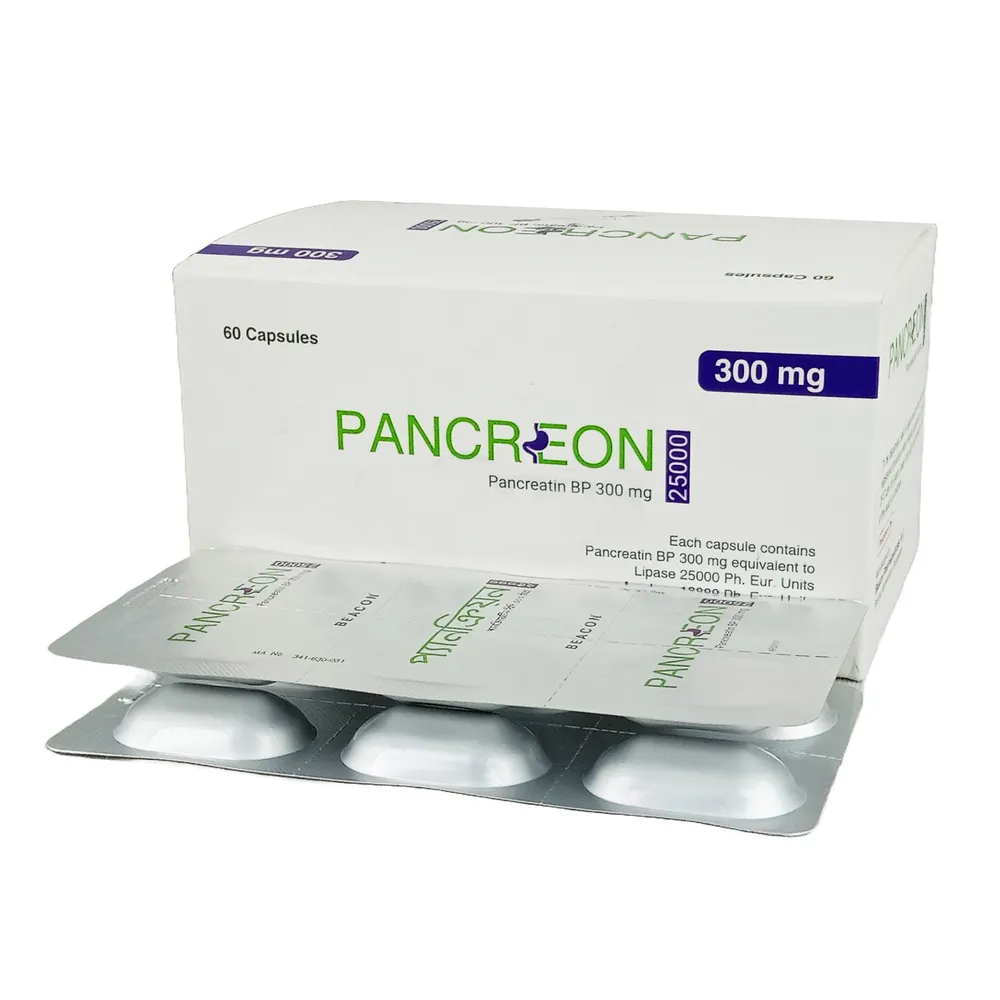Pancreon 25000 Capsule (Enteric Coated)
Pack Image
300 mg
Unit Price:
৳ 70.00
(10 x 6: ৳ 4,200.00)
Strip Price:
৳ 420.00
Also available as:
Indications
Pancreon 25000 is indicated for the treatment of-
- Exocrine pancreatic insufficiency due to cystic fibrosis
- Chronic pancreatitis
- Pancreatectomy or other conditions
Composition
Pancreatin 10000 capsule contains-
- Pancreatin BP 150 mg equivalent to Lipase 10000 Ph. Eur. Units,
- Amylase 8000 Ph. Eur. Units,
- Protease 600 Ph. Eur. Units.
- Pancreatin BP 300 mg equivalent to Lipase 25000 Ph. Eur. Units,
- Amylase 18000 Ph. Eur. Units,
- Protease 1000 Ph. Eur. Units.
Pharmacology
The pancreatic enzymes in pancreatin catalyze the hydrolysis of fats to monoglyceride, glycerol and free fatty acids, proteins into peptides and amino acids, and starches into dextrins and short chain sugars such as maltose and maltriose in the duodenum and proximal small intestine, thereby acting like digestive enzymes physiologically secreted by the pancreas.
Dosage & Administration
Infants (up to 12 months): Infants may be given 2,000 to 4,000 lipase units per 120 mL of formula or per breast-feeding. Do not mix pancreatin capsule contents directly into formula or breast milk prior to administration.
Children older than 12 months and younger than 4 years: Enzyme dosing should begin with 1,000 lipase units/kg of body weight per meal for children less than age 4 years to a maximum of 2,500 lipase units/kg of body weight per meal (or less than or equal to 10,000 lipase units/kg of body weight per day), or less than 4,000 lipase units/g fat ingested per day.
Children 4 years and older and adults: Enzyme dosing should begin with 500 lipase units/kg of body weight per meal for those older than age 4 years to a maximum of 2,500 lipase units/kg of body weight per meal (or less than or equal to 10,000 lipase units/kg of body weight per day), or less than 4,000 lipase units/g fat ingested per day.
Administration: Pancreatin is not interchangeable with any other pancrelipase product. Pancreatin should be swallowed whole. For infants or patients unable to swallow intact capsules, the contents may be administered without crushing or chewing, followed by fluid to ensure complete ingestion.
Children older than 12 months and younger than 4 years: Enzyme dosing should begin with 1,000 lipase units/kg of body weight per meal for children less than age 4 years to a maximum of 2,500 lipase units/kg of body weight per meal (or less than or equal to 10,000 lipase units/kg of body weight per day), or less than 4,000 lipase units/g fat ingested per day.
Children 4 years and older and adults: Enzyme dosing should begin with 500 lipase units/kg of body weight per meal for those older than age 4 years to a maximum of 2,500 lipase units/kg of body weight per meal (or less than or equal to 10,000 lipase units/kg of body weight per day), or less than 4,000 lipase units/g fat ingested per day.
Administration: Pancreatin is not interchangeable with any other pancrelipase product. Pancreatin should be swallowed whole. For infants or patients unable to swallow intact capsules, the contents may be administered without crushing or chewing, followed by fluid to ensure complete ingestion.
Interaction
No drug interactions have been identified. No formal interaction studies have been conducted.
Side Effects
The most serious adverse reactions reported with different pancreatic enzyme products of the same active ingredient (pancrelipase) include fibrosing colonopathy, hyperuricemia and allergic reactions.
Pregnancy & Lactation
Pregnancy category C: Animal reproduction studies have not been conducted with pancrelipase. It is also not known whether pancrelipase can cause fetal harm when administered to a pregnant woman or can affect reproduction capacity. The risk and benefit of pancrelipase should be considered in the context of the need to provide adequate nutritional support to a pregnant woman with exocrine pancreatic insufficiency. Patients should notify their healthcare professional if they are pregnant or are thinking of becoming pregnant during treatment with Pancreatin.
Nursing mothers: It is not known if pancrelipase is excreted in human milk. Patients should notify their healthcare professional if they are breast-feeding.
Nursing mothers: It is not known if pancrelipase is excreted in human milk. Patients should notify their healthcare professional if they are breast-feeding.
Precautions & Warnings
Fibrosing colonopathy: Fibrosing colonopathy has been reported following treatment with different pancreatic enzyme products.Fibrosing colonopathy is a rare, serious adverse reaction initially described in association with high-dose pancreatic enzyme use, usually over a prolonged period of time and most commonly reported in pediatric patients with cystic fibrosis.
Potential for Irritation to oral mucosa: Pancreon 25000 should not be crushed or chewed or mixed in foods having a pH greater than 4. These actions can disrupt the protective enteric coating resulting in early release of enzymes, irritation of oral mucosa, and/or loss or enzyme activity.
Potential for risk of hyperuricemia
Potential viral exposure from the product source
Allergic reaction
Potential for Irritation to oral mucosa: Pancreon 25000 should not be crushed or chewed or mixed in foods having a pH greater than 4. These actions can disrupt the protective enteric coating resulting in early release of enzymes, irritation of oral mucosa, and/or loss or enzyme activity.
Potential for risk of hyperuricemia
Potential viral exposure from the product source
Allergic reaction
Overdose Effects
There have been no reports of overdose in clinical trials with Pancreon 25000, or in clinical trials or postmarketing surveillance with other pancreatic enzyme products. Chronic high doses of pancreatic enzyme products have been associated with fibrosing colonopathy . High doses of pancreatic enzyme products have been associated with hyperuricosuria and hyperuricemia, and should be used with caution in patients with a history of hyperuricemia, gout, or renal impairment.
Therapeutic Class
Digestive Enzyme
Storage Conditions
Store below 25°C and dry place, away from light and moisture. Keep out of the reach of children.


